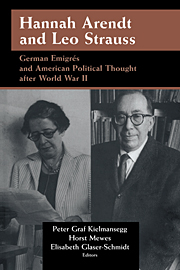Discussion
Published online by Cambridge University Press: 05 January 2013
Summary
A roundtable discussion on the last day of the Boulder conference summarized the main issues examined in the essays of this volume. It also served to hone the questions raised during the conference and thus offers spontaneous insights into the interpretation of Arendt's and Strauss's work on both sides of the Atlantic. The discussion touched upon three basic themes: (1) the influence of German philosophy on these two philosophers, (2) their American experience, and (3) their respective views on democracy. What follows is an abridged and edited version of the discussion transcript, wherein redundancies have been omitted.
PETER GRAF KIELMANSEGG: I propose to begin with questions concerning the intellectual and cultural background, that is, the origins, roots, and connections between Hannah Arendt's and Leo Strauss's thinking. Next, we could revisit the question of what could be called the Americanization of Arendt and Strauss, that is, the question of the extent to which the books they wrote in this country reflect the fact that these authors have become Americans. And third, I suggest that we take up a topic of more general relevance, namely, the relationship of Arendt and Strauss to democracy. They experienced the failure of democracy in Germany, had an existential encounter with a totalitarian dictatorship, and eventually became citizens of a successful republic. Many of our questions could be brought into this context, by which I do not mean that their biographies are necessarily the most important factors in explaining their attitudes toward democracy; but it is perhaps one way of looking at the problem.
- Type
- Chapter
- Information
- Hannah Arendt and Leo StraussGerman Émigrés and American Political Thought after World War II, pp. 163 - 190Publisher: Cambridge University PressPrint publication year: 1995



